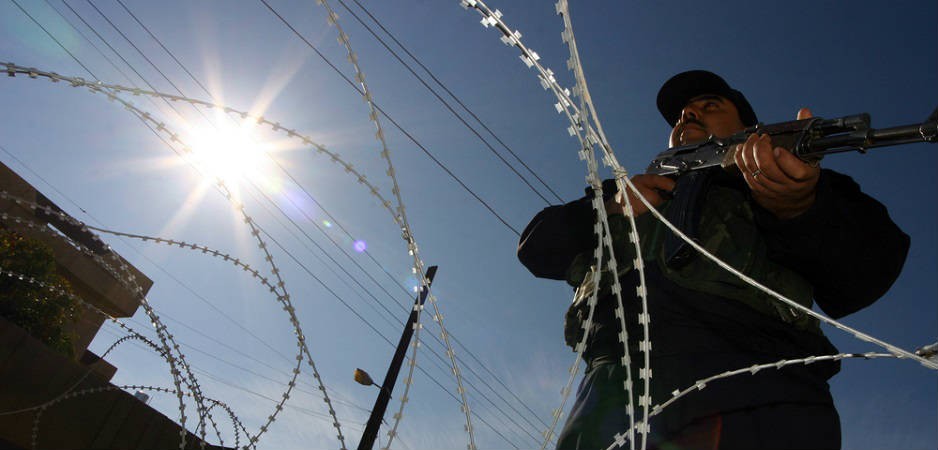A global slowdown is in the offing as big beasts of the world economy stumble.
Newspapers in the United States and Britain are still theorizing about Prime Minister Binyamin “Bibi” Netanyahu’s supposedly surprising victory at the polls. The reality is that the Israeli elections were not that big a deal. The elephant in the room this week is the world economy.
First, the US Federal Reserve (Fed) lowered its forecast for growth and inflation. At the same time, it did not promise to be “patient” about raising interest rates. The Fed is worried that loose monetary policy might be leading to bubbles in the American economy. Silicon Valley might be the prime example of “irrational exuberance” with Facebook shares reaching a record high on Thursday. Those with assets are prime beneficiaries of the Fed’s munificence and have got wealthier, while les sans culottes struggle to make ends meet and become poorer. No wonder the Fed is thinking about raising rates.
Yet the Fed is wary of raising rates. It is caught between the Scylla of a bubble and the Charybdis of a recession. Not raising rates might lead to a crash in asset prices in the same manner as 2008. Raising them might lead to a stronger dollar, lower exports and fewer jobs. It might derail an anemic economic recovery. At a time when Sweden’s central bank has joined the European Central Bank (ECB) in pumping money into the economy by cutting its interest rate and increasing quantitative easing, the Fed is terrified of any action that might jeopardize the economy.
Second, property value in China fell on average by 5.7%, the steepest decline since 2011 when a nationwide survey was instituted. Chinese banks have been merrily lending to real estate companies. These companies are in trouble. Banks had to bail out Evergrande, a behemoth deep in debt, by offering a $16 billion line of credit. The fall in property prices will increase the bad debts banks have on their books. Pessimists predict a crisis if not a crash. Optimists like Aditya Rana point out that pundits in London and New York have been wrong before. The Economist predicted a financial crisis and a decade of instability in June 2002.
The new normal for the Chinese economy will be lower growth. It will be increasingly driven by domestic demand instead of exports. Lower Chinese growth will still be a lot higher than growth in the US or Europe. It is for this reason that foreign companies increased their investment in China from $123.9 billion in 2013 to $127.6 billion in 2014. However, lower Chinese growth means less demand for commodities. This explains the slump in commodity prices, which is bad news for countries like Brazil.
Third, countries that relied on the boom of the 2000s face tough times in the coming years. Brazil’s economy is likely to shrink in 2015 for the second consecutive year, the first such contraction in the country since the Great Depression when the economy contracted in both 1929 and 1930. During the recent boom, Brazil’s political bosses implemented short-term populist policies. They did not invest in infrastructure or education. Brazil’s roads remain ghastly and its ports are clogged. The country’s infrastructure is decrepit and the World Economic Forum ranks it at 104th out of 142 countries. Poor education in a deeply unequal society has led to a labor force with low skills and fewer opportunities to move up in life.
While Argentina and Venezuela are basket cases lurching from one crisis to another, Brazil’s economy manages to raise expectations before dashing them repeatedly. This week, over a million people marched across Brazil to protest against President Dilma Rousseff and demand her impeachment. The long-running Petrobas scandal has been gnawing away at her credibility for a while. Her recent re-election was “a damn close-run thing,” and her political base is shriveling dramatically day by day. Inflation is high, jobs are scarce and corruption rife. The heady days of 2010 when the country grew at 7.5% growth are over. Brazil has to tighten its belt at a point of low oil prices. Troubled times lie ahead.
Often, democracy does not lend itself to long-term thinking. In Brazil, the government primed the pump to win the election. It achieved its goal. Now, the hangover has set in. Felipe Machado, a journalist and author in São Paulo, points out that the legal and political grounds for Rousseff’s impeachment are flimsy. The protests are just an expression of disappointment and discontent. Even in as corrupt a country as Brazil, people are shocked by the amounts stolen. More importantly, a rising middle-class has long wanted a more modern state where red tape strangulates them a little less and where they can lead better lives. Comically, Fernando Haddad, the foolish mayor of São Paulo who belongs to Rousseff’s party, is banning breastfeeding in public. He will fine women $150 if they disobey. This is a regressive measure that will hurt women in general and poor women in particular. Clearly, Rousseff’s party has been in power a touch too long.
Even as the world economy sputters, Jack Lew, the US Treasury secretary, turned up in Congress to plead support for “quota reforms” in the International Monetary Fund (IMF). He wants to give China a greater role in the IMF by increasing its quota of voting rights that is more cognizant of its economic might. Lew argued that it is a good idea to embed China in the system of multilateral institutions that the US itself created at the end of World War II. As Lew points out, today the rest of the world wonders if the US is committed to multilateral institutions anymore. Many emerging economies believe that the IMF is a white man’s club where those with black, yellow and brown skin are meant to polish shoes and clean table tops. They are not willing to wait anymore for a seat on the table.
The Chinese have taken the bull by the horns and created the new Asian Infrastructure Development Bank in Shanghai. This week, Britain, France, Germany and Italy signed up for the new club despite the opposition of the US. All of them are long-standing allies of the US and wield considerable power in the IMF. Yet they recognize the return of the Middle Kingdom to the world stage and are demonstrating a new willingness to kowtow. The “Asia Pivot” of US President Barack Obama has been an abject failure, thanks in no small part to the lovely people in Congress.
Last week, US senators wrote an ill-conceived and poorly drafted letter to Iran. They demonstrated that those who did not know the law are now drafting the law of the land. This week, in three hours, thirty minutes and thirty seconds of infernally boring questioning, congressmen demonstrated horrific ignorance about the world economy. They delighted in chasing squirrels and missed the wood for the trees. With such wonderful helmsmen, God help America!
Finally, God did help Bibi, the leader of the chosen people. He trumped exit polls and pundits to win. Fear worked. Israelis voted for the man who stands up to Iran and the White House. The two-state solution is dead. It is springtime for Bibi and Israel, but winter for Obama and Palestine.
*[You can receive “The World This Week” directly in your inbox by subscribing to our mailing list. Simply visit Fair Observer and enter your email address in the space provided. Meanwhile, please find below five of our finest articles for the week.]
[seperator style=”style1″]Tunisia’s Security Nightmare Predates the Arab Spring[/seperator]
Tunisia’s problem with radical Islamism has been steadily brewing since the days of the Ben Ali regime.
Until now, Tunisia seemed to have escaped the worst of the violence that has beset the countries of the Arab Spring. Instead, this small nation, whose revolution for democracy and dignity sparked a wave of protest across the Arab world four years ago, looked like the only success story left.
But the shocking attack at the Bardo Museum in Tunis on March 18, which left at least 20 dead, including 17 foreign tourists, marks a profound setback to this rare democratic transition, and it may herald a new wave of violence and political crisis.
Jihadi Salafist groups have emerged in force in Tunisia since the Arab Spring, staging small-scale attacks on the military in a mountainous region near the Algerian border, a violent assault on the US Embassy in Tunis in 2012, and then high-profile assassinations of two opposition politicians, Chokri Belaid and… Read more
[seperator style=”style1″]Cannabis Legalization Promotes Public Health and Safety[/seperator]
The question is not whether we should legally regulate cannabis, but how and when.
The issue of cannabis legalization has moved decisively from the margins to the mainstream of political debate. Over recent years, Uruguay and four US states, as well as Washington DC, have decided to legalize cannabis for non-medical use, becoming the first jurisdictions in the world ever to do so. As these reforms demonstrate, there is now a growing recognition that the prohibition of cannabis is a counterproductive failure and that alternative approaches should be explored.
Prohibition and the so-called “War on Drugs” have not only failed to achieve their stated aims of reducing or eliminating drug supply and use, they have also actively caused harm. The United Nations Office on Drugs and Crime (UNODC), the very agency that enforces and oversees drug prohibition worldwide, has itself acknowledged that punitive, enforcement-led drug policies are generating a range of disastrous “unintended consequences.” (Although given how well-documented they are… Read more
[seperator style=”style1″]What Happens After the Battle for Tikrit?[/seperator]
In the battle for Iraq, Sunnis must be assured that they have a place in the country after the Islamic State.
Will we see a victory against the Islamic State? Maybe. This will depend entirely on what metric we might use to measure success in victory. Will this be defined by the number of insurgents that have been killed or wounded? In a war of attrition that is asymmetric, measurement against a body count is practical — if not a bit gruesome. Or do we measure the political prowess of lawmakers who see genuine opportunity in resolving the conflict? The only real solution to defeat the Islamic State is political, but in the murky world of geopolitics, sometimes the best option is to maintain the status quo.
Regardless of what your opinion might be, the inevitable climax in the battle for Tikrit will soon provide the answers to all of these questions and more. The significance of the military operation to retake Tikrit in Iraq… Read more
[seperator style=”style1″]No Sinn Fein, Responsibility Comes With Power[/seperator]
Former Prime Minister John Bruton argues that an unwillingness to accept that with power comes responsibility is at the heart of the Northern Ireland crisis.
I write about the following matter with some feeling because, like others, I have devoted a significant amount of time and effort over ten years or more to creating conditions in which, as part of a wider settlement, nationalists and unionists would share power and responsibility in Northern Ireland. Responsibility goes with power, and recent events suggest that some people want the power, but prefer to dodge the responsibility that goes with it.
The debacle over welfare reform in Northern Ireland, and the resulting risk that power-sharing institutions themselves will collapse, raises a doubt over whether Sinn Fein is a serious political party, capable of exercising government responsibility in any jurisdiction.
On December 23, 2014, after months of brinkmanship and suspense, Sinn Fein and other parties agreed to a package of measures in the Stormont House Agreement. Read more
[seperator style=”style1″]Forget the Catwalk, Sarees Are Modest and Sexy[/seperator]
Indian sarees can symbolize modesty and seduction, but are they going out of fashion?
An Indian saree, six yards of utter simplicity and audacity, is the perfect garment. Folded, it looks severe and perplexing, like an extra-long bed sheet. Draped, it transforms itself and its wearer. No apparel so embodies the spirit of the region it represents. The saree suggests at once the minimalism of the ascetic and the sensuality of the tropics: lushness, sweat, sparkling white cotton, bare caramel-to-cocoa skin, loose folds of clothing that easily pull on and off.
No other garment is as antique and yet contemporary. The saree was worn by women of the Indian subcontinent thousands of years ago — and still is. No other civilization has spawned a garment that has survived so long, and yet even managed to thumb its nose at being embalmed in a museum.
The saree is worn at home and work by millions of Indian women from all walks of life. Read more
The views expressed in this article are the author’s own and do not necessarily reflect Fair Observer’s editorial policy.
Photo Credit: Allen G / Olegator / Shutterstock.com
 We bring you perspectives from around the world. Help us to inform and educate. Your donation is tax-deductible. Join over 400 people to become a donor or you could choose to be a sponsor.
We bring you perspectives from around the world. Help us to inform and educate. Your donation is tax-deductible. Join over 400 people to become a donor or you could choose to be a sponsor.
Support Fair Observer
We rely on your support for our independence, diversity and quality.
For more than 10 years, Fair Observer has been free, fair and independent. No billionaire owns us, no advertisers control us. We are a reader-supported nonprofit. Unlike many other publications, we keep our content free for readers regardless of where they live or whether they can afford to pay. We have no paywalls and no ads.
In the post-truth era of fake news, echo chambers and filter bubbles, we publish a plurality of perspectives from around the world. Anyone can publish with us, but everyone goes through a rigorous editorial process. So, you get fact-checked, well-reasoned content instead of noise.
We publish 2,500+ voices from 90+ countries. We also conduct education and training programs
on subjects ranging from digital media and journalism to writing and critical thinking. This
doesn’t come cheap. Servers, editors, trainers and web developers cost
money.
Please consider supporting us on a regular basis as a recurring donor or a
sustaining member.
Will you support FO’s journalism?
We rely on your support for our independence, diversity and quality.













Comment